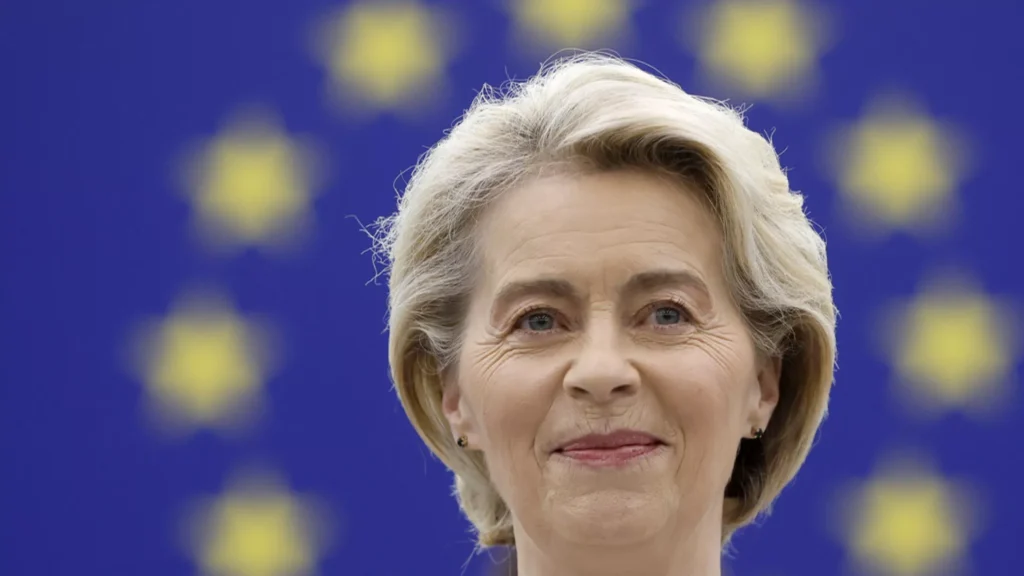As the deadline for nominating European Commissioners approached, EU member states rushed to submit their candidates for Ursula von der Leyen’s second term as President of the European Commission. This crucial process has seen most countries meet the required deadline, but a few notable developments and delays have shaped the final hours of this nomination phase.
Bulgaria Leads with a Balanced Approach
Bulgaria has emerged as a unique case in this round of nominations. In a rare move that aligns directly with von der Leyen’s request, Bulgaria has proposed both a male and a female candidate. The country put forward Ekaterina Zaharieva, the former Foreign Minister, and Julian Popov, the former Ecology Minister. This decision came after intense discussions between Bulgarian President Rumen Radev and Prime Minister Dimitar Glavchev, reflecting the nation’s commitment to gender balance. Zaharieva and Popov bring with them a wealth of experience in international diplomacy and environmental policy, respectively, positioning Bulgaria as a key player in shaping the future of the European Commission.
Italy’s Veteran Choice: Raffaele Fitto
Italy, known for its strong political presence within the EU, has nominated Raffaele Fitto as its candidate for European Commissioner. Fitto, a seasoned politician with deep roots in both Italian and European politics, has had a long and distinguished career. Born in Maglie, Lecce province, in 1969, Fitto began his political journey as a regional councillor with the Christian Democratic Party in 1990. Over the years, he has held various important posts, including serving as a Member of the European Parliament (MEP) in 1999, 2014, and 2019. Fitto’s extensive experience in European affairs and his legal background make him a strong candidate, likely to influence key policy areas within the Commission.
Denmark’s Strategic Nomination: Dan Jørgensen
Denmark has taken a strategic approach by nominating Dan Jørgensen, a social democrat with significant experience in European politics. Jørgensen, who started his political career as an MEP in 2004, has been an active figure in the European political landscape for nearly a decade. His nomination was part of a broader cabinet reshuffle announced by Danish Prime Minister Mette Frederiksen, underscoring Denmark’s intention to play a vital role in the new Commission. Jørgensen’s background in environmental and energy policies aligns well with the EU’s Green Deal initiatives, making him a potentially influential voice in the Commission’s efforts to combat climate change.
Belgium’s Political Stalemate: A Looming Deadline
Belgium, however, finds itself in a precarious position as it has yet to finalize its nominee for the European Commission. The country’s political landscape has been in turmoil following its June elections, leaving it as the only EU member state to miss the nomination deadline. This delay is particularly significant as von der Leyen is keen on ensuring a gender-balanced Commission, and Belgium’s nomination could tip the scales. The ongoing political instability has made it difficult for Belgium to reach a consensus on a suitable candidate, and this uncertainty may have broader implications for the composition of the new Commission.
What’s Next?
With the deadline now passed, the final list of European Commissioners is expected to be revealed by mid-September. Once all nominations are in, the candidates will be assigned specific portfolios, reflecting their expertise and the strategic needs of the EU. Following these assignments, the nominees will undergo rigorous confirmation hearings in the European Parliament, where their visions, policies, and competencies will be scrutinized.
These hearings are a critical step in ensuring that the European Commission is composed of individuals capable of leading the EU through a complex set of challenges, ranging from economic recovery post-pandemic to the ambitious goals of the European Green Deal. The decisions made in the coming weeks will have a profound impact on the direction of the EU over the next five years, making this a pivotal moment in European politics.
The outcome of Belgium’s nomination process, in particular, will be closely watched, as it has the potential to influence the overall balance and effectiveness of the new Commission. The next few weeks will be crucial in determining how the EU’s executive branch will be shaped and how it will approach the critical issues facing Europe today.



